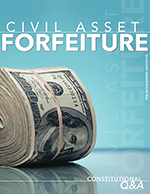Legal Features
Constitutional Q&A: Civil Asset Forfeiture
© 2017 The Rutherford Institute[1]
“The fact is that the government, like a highwayman, says to a man: Your money, or your life. And many, if not most, taxes are paid under the compulsion of that threat. The government does not, indeed, waylay a man in a lonely place, spring upon him from the road side, and, holding a pistol to his head, proceed to rifle his pockets. But the robbery is none the less a robbery on that account; and it is far more dastardly and shameful.”[2]— Lysander Spooner, American abolitionist and legal theorist
Relying on the topsy-turvy legal theory that one’s property can not only be guilty of a crime but is guilty until proven innocent, government agencies at all levels have eagerly cashed in on civil asset forfeiture as a revenue scheme under the pretext of the War on Drugs.
Civil asset forfeiture schemes allow police and prosecutors to “seize your car or other property, sell it and use the proceeds to fund agency budgets—all without so much as charging you with a crime.”[3] This incentive-driven excuse for stealing from the citizenry is more accurately referred to as “policing for profit” or “theft by cop.” Indeed, in one year alone, as The Washington Post reported, “law enforcement took more stuff from people than burglars did.”[4]
As constitutional attorney John W. Whitehead points out, if the government can arbitrarily freeze, seize or lay claim to your property (money, land, or possessions) under government asset forfeiture schemes, you have no true rights.[5]
The Ugly Business of Asset Forfeiture
Supposedly, “we the people” are presumed innocent until proven guilty. Civil asset forfeiture, however, turns that rule on its head. In fact, with civil forfeiture, the property is guilty until the owner proves its innocence.



